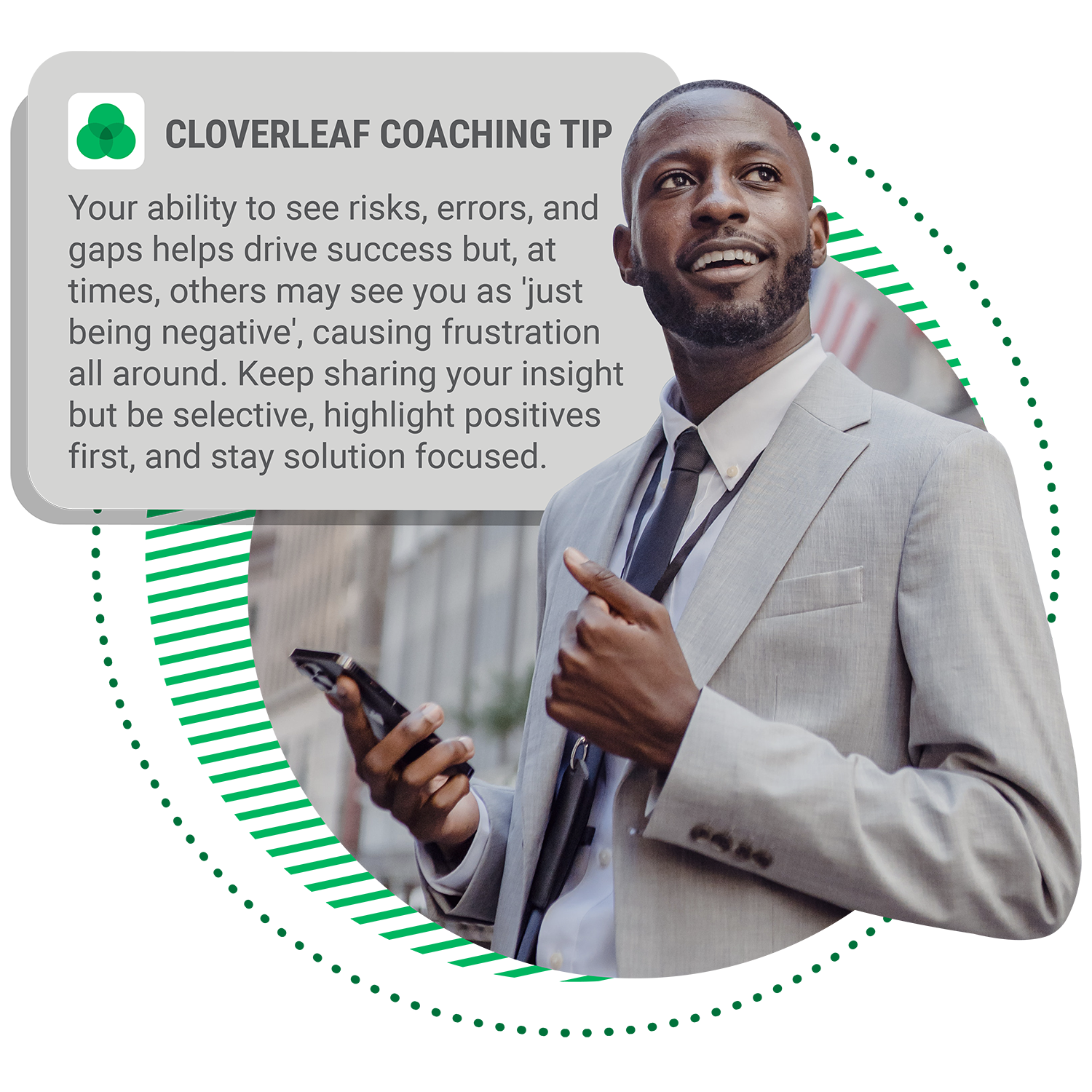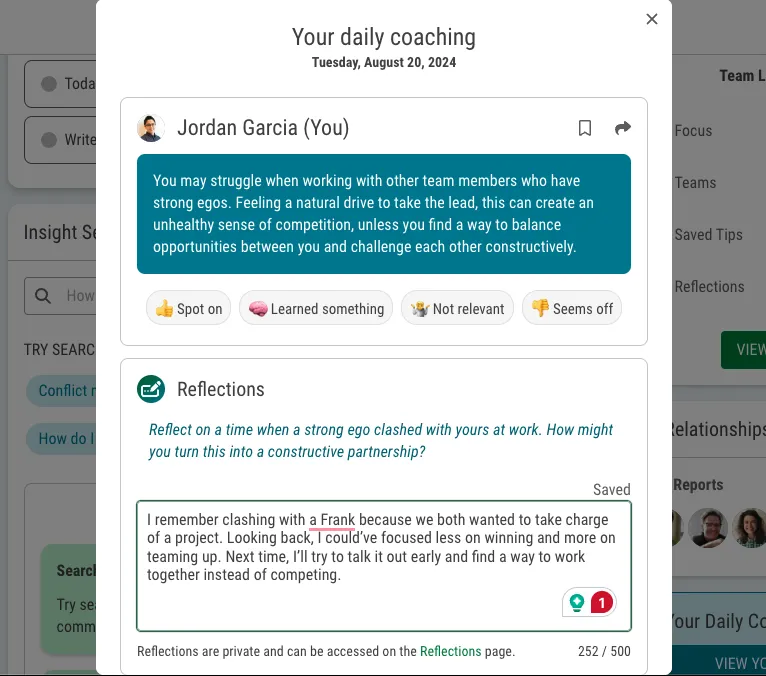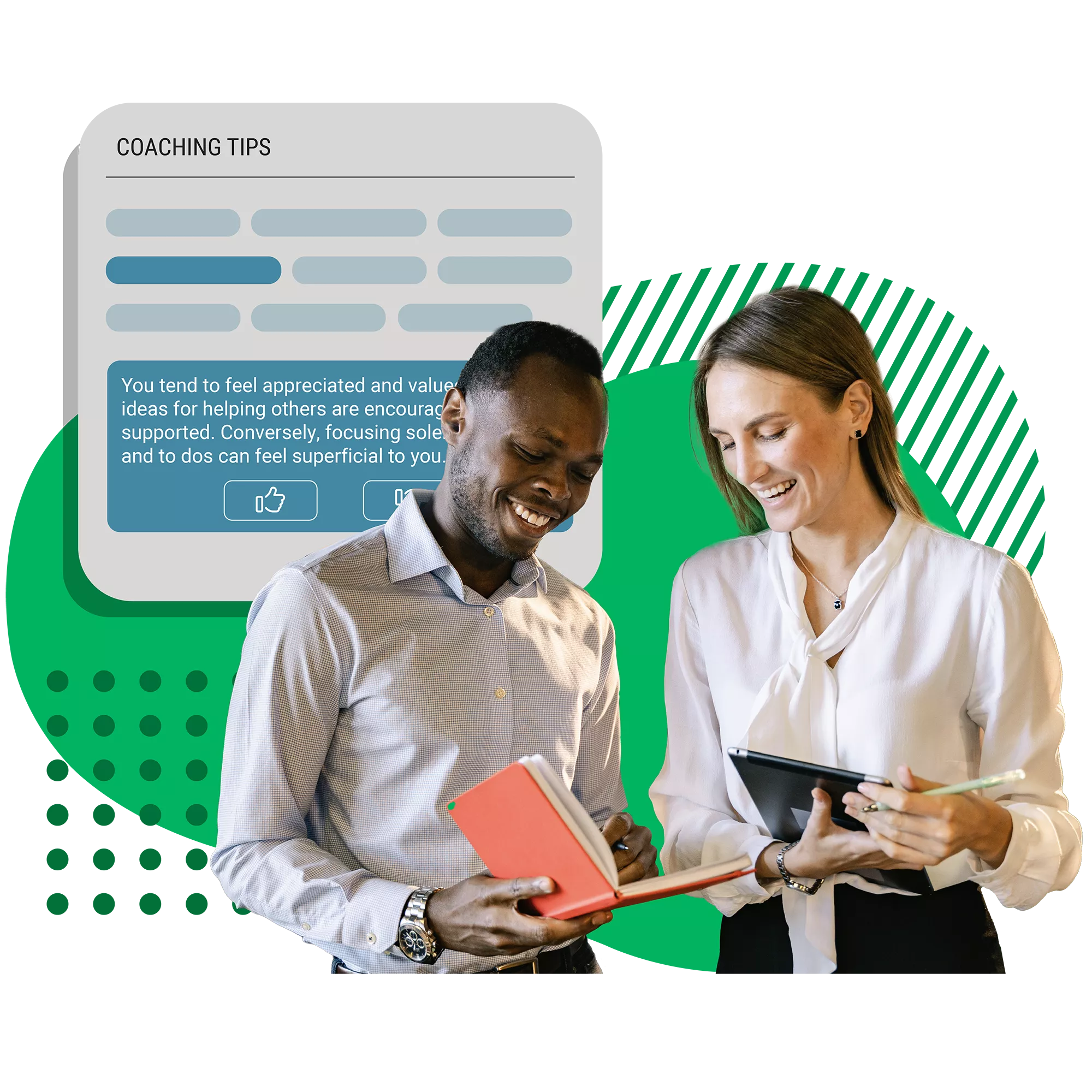Your team is busy—navigating tight deadlines, back-to-back meetings, and shifting priorities. Traditional coaching programs? Of course, they’re valuable, but they can often cause those participating to feel like it is an additional task that competes with their productivity. It’s a challenge to designate time, space, and mental energy to lengthy sessions or wait for their next performance review to get the feedback they need. And teams are often scattered, hybrid, or remote, and the demands for agility are higher than ever.
That’s why leaders are turning to micro-coaching. Think bite-sized, actionable nudges delivered directly within the workday—digital coaching that meets your team where they are, when they need it most. It’s not about scheduling sessions; it’s ongoing, accessible development that drives growth without disrupting the workday.
Micro-coaching can make personalized coaching possible for entry-level employees to executive leaders – everyone can have an equal opportunity to develop. Let’s explore why this approach is more than a trend; it’s a necessary evolution for teams striving to grow and adapt as the workplace seems to reinvent itself daily.

Overcoming Coaching Bottlenecks To Organization-Wide Development
One of the primary barriers to impactful coaching is its resource-intensive nature. Whether it’s one-on-one sessions, workshops, or coaching at group levels, these approaches are simply too costly and logistically challenging to scale across a fast-moving, dynamic workforce. A survey by the Institute of Coaching found that only 23% of employees receive the coaching support they need to thrive.
Employees require immediate, context-specific feedback that addresses the challenges they’re facing in the moment—not at the next scheduled coaching session. What happens in the meantime? Employees spend days or weeks struggling with tasks or team dynamics, missing the opportunity for improvement when they need it most.
People think and work differently, have different motivators, and face different obstacles. Employees crave relevant guidance that fits their specific needs and helps them solve immediate problems. This not only serves the individual but the overall organization. According to Gallup, 80% of employees who have received meaningful feedback in the past week are fully engaged.
Can Coaching Scale Without Losing Personalization?
The barrier to widespread coaching is the ability to scale without losing personalization. Tools like automated coaching eliminate this problem by personalized coaching within the platforms teams use—such as Slack, Microsoft Teams, or email. These insights are more than simple tips—they’re personalized, real-time feedback designed to fit seamlessly into daily workflows.
This high level of personalization is possible through data from validated assessments. Tools like Automated Coaching™ use insights from behavioral and strength-based assessments (e.g., DISC, 16 Types, Enneagram) to tailor nuanced, in-depth coaching tips. For example, if someone is about to enter a meeting with a teammate who approaches problem-solving differently, the tool can provide a nudge on how best to communicate or collaborate effectively with that colleague.
These nudges are not generic—they’re context-specific, grounded in each person’s behavioral tendencies and current work context. By embedding these micro-coaching moments directly into the platforms teams are already using, the learning becomes timely and relevant, aligning with the specific situation an employee is navigating at that moment. This makes coaching timely and integrated into the workflow rather than something external and time-consuming.
Ready To Provide Personalized Mico Coaching To Your Team?

Making Coaching Personal and Practical for Every Person, Every Day
Scaling coaching without losing its personalized impact can be a major hurdle. This is where micro-coaching, especially automated micro coaching, makes a real difference. Let’s break down why this matters:
1. Scalability Without Sacrificing Personalization:
Traditional coaching often fails to scale because it requires one-on-one sessions or lengthy group workshops. Automated Coaching™ solves this by delivering tailored, actionable insights to every employee, from entry-level to leadership. Unlike other solutions that rely on broad recommendations, each nudge is powered by deep psychometric data, ensuring feedback is relevant to both the individual and the situation they’re navigating. This transforms coaching into something personal, not cookie-cutter.
2. Timely, Context-Specific Insights:
Coaching should be relevant to what’s happening right now—whether someone’s preparing for a difficult meeting or handling team dynamics. The key to Automated Coaching™ lies in its integration with platforms like Slack, Microsoft Teams, and email. Each tip isn’t just random advice—it’s triggered by current work scenarios and team interactions, offering on-the-spot guidance that helps employees overcome specific challenges in real-time. This personalized coaching isn’t based on generic templates but aligned with each person’s work style and behavioral tendencies.
3. Continuous Learning Without Disruption:
Instead of waiting for performance reviews or scheduled coaching sessions, automated micro coaching can deliver daily, digestible tips that promote ongoing development. Learning happens in the moment, without pulling people away from their daily workflow. By embedding micro-coaching into the tools your teams already use, the entire process feels seamless. Development is no longer an interruption—it becomes part of the daily rhythm, allowing immediate application of new skills and reinforcing them regularly.
4. Measurable Impact on Engagement:
Research shows that companies fostering strong coaching cultures report a 62% increase in employee engagement and 51% higher revenue. Regular micro-coaching creates more touchpoints for feedback, which directly correlates to increased job satisfaction and productivity, ensuring teams don’t just burn out but thrive.
How to Introduce Micro-Coaching Successfully To Your Team
Introducing any new coaching initiative can be met with hesitation or outright resistance, whether it’s due to change fatigue, skepticism about effectiveness, or concerns over time commitment. The key to overcoming this resistance and ensuring sustained engagement lies in thoughtful strategy and alignment with employee needs. Here are a few key strategies that can make all the difference:
1. Start with Clear Communication and Transparency.
Employees may not understand the benefits or worry that it’s just another task added to their full plate. It’s not enough to say, “here’s a new tool.” People want to know why it matters to them. Make the introduction of micro-coaching personal by showing how it addresses pain points they’re experiencing today—whether juggling multiple priorities, resolving conflicts faster, or collaborating more effectively. Gather key stakeholders in a live session, but make the conversation interactive—ask for concerns and suggestions so it is collaborative rather than top-down.
IMPORTANT: Email should never be used to introduce a new idea or concept. Email is for notification (i.e., “Here are the meeting notes,” “Attached is the proposal”), not communication.
2. Highlight Immediate Value and Quick Wins.
It’s critical to showcase immediate, practical benefits, such as helping them solve current challenges or improve day-to-day interactions so team members can see the value right away. For example, micro coaching can deliver tips for approaching a challenging meeting or handling communication issues. These contextual, bite-sized tips solve real problems at the moment, which builds trust and engagement over time. When people see the value early on, they’re more likely to stay engaged.
3. Always Lead by Example.
Leadership buy-in is essential. Managers need to not only use micro-coaching but also share how it’s made a difference in their work. They could provide specific examples of how an insight helped them defuse a conflict or guide their team more effectively. When people see their leaders investing in the same growth tools, they’re more likely to follow suit.
4. Use Data to Prove Impact.
Showing employees the tangible results of micro-coaching, like improved team collaboration, higher engagement, or faster problem-solving, reinforces the initiative’s effectiveness. Tools like Cloverleaf track can help you offer actionable data that leaders can share to prove micro-coaching is driving real results.
Introducing micro-coaching to your team may require changing mindsets about ways coaching can happen inside your organization. Leaders can ensure that it is embraced by communicating the benefits clearly, focusing on quick wins, modeling leadership, and proving impact with data.
From Theory to Reality: How Micro-Coaching Is Transforming Leadership Development
It’s one thing to understand the theory behind micro-coaching, but what does it look like in practice? How do you ensure it’s more than just another initiative that fades into the background? Leaders need to see clear, tangible results that prove its effectiveness in organizations just like yours.

Here’s a real-world example of how Automated Micro Coaching was integrated into a 6-month leadership program involving over 200 leaders—from first-time managers to C-level executives. Throughout the program, leaders received personalized coaching nudges and saw firsthand how micro-coaching could seamlessly fit into their daily routines while delivering impactful results.
What Leaders Had to Say:
- I have interacted with team members differently based on what I learned about their thinking and outlook on Cloverleaf. For example, I am more direct with one team member than I have been in the past. It also has helped me understand that my outlook on several things is specific to me and may not be the way everyone looks at the world.
- Using Cloverleaf actually built confidence in the way I approach conversations with my employees. I’m having to talk to individuals and to larger size groups of people more often in my role. Using Cloverleaf to plan communications helps me to keep important things in mind when coaching leaders through some of the issues they face with our staff. Cloverleaf coaching insights helped me learn how to listen, re-direct conversations, and check for understanding so that everyone is clear on the issue.
- I had to have a discussion with one of my managers to clear expectations for the position. I took some time prior to the meeting to use Cloverleaf to plan how the conversation would be presented and structured, specific to the person I was speaking to. It helped by creating an organized discussion.
- I appreciate Cloverleaf’s suggestions on how to interact with all individuals of my team and the teams I am on. It helps me prepare for meetings to have more effective 1-1 and team conversations.
- I read the daily assessment of myself and used the information to practice interactions between coworkers with different personalities. It has helped progress relationships.
Micro-Coaching's Role In The Future of Talent Development
As businesses race toward personalization and adaptability, micro-coaching is rapidly becoming the linchpin of talent development strategies. The future of this approach is clear: data-driven insights from tools that use AI for seamless integration into everyday workflows will not only refine how teams learn and grow but also revolutionize how we think about development altogether.
- AI-Powered Precision: Imagine a system where coaching is so finely tuned that it can predict when a manager needs feedback on delegation before a meeting or nudge an employee toward collaboration techniques just as they’re about to start a high-stakes project. This level of personalization ensures that employees get relevant guidance exactly when needed.
- Data-Driven Insights: Data insights will move beyond generic performance metrics. With real-time tracking, leaders will have access to behavioral shifts, engagement increases, and conflict resolution success rates—pinpointing exactly where coaching delivers its most powerful impact. These metrics will not only refine coaching programs but demonstrate clear ROI, ensuring sustained investment in talent development.







